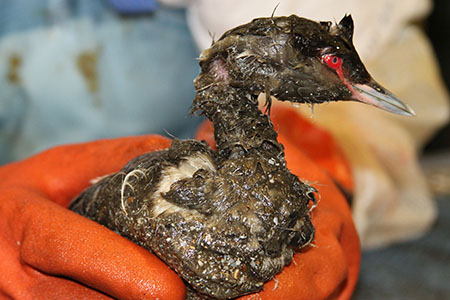Recently, San Francisco Baykeeper responded to four separate oil spills into San Francisco Bay. In only one did the responsible party take action to help with the cleanup.

This horned grebe was exposed to the “mystery goo” that appeared in the Bay recently. Luckily it was rescued and nursed back to health by members of International Bird Rescue. Photo courtesy of International Bird Rescue
By Deb Self
Published: March, 2015
First, over the course of several days in mid-January, a sticky toxic substance coated and killed hundreds of ducks and shorebirds along the East Bay shoreline. Scientists have now identified the “mystery goo” as a non-petroleum synthetic oil that broke down into a sticky, thick, gray substance. But there is no obvious source, and no one took responsibility. This incident highlights the ways we need to improve the response and cleanup of oil spills in the Bay.
California government officials initially reported something along the lines of, “We don’t know what it is, but we know it’s not petroleum.” California has an outstanding state-funded organization that rescues wildlife during an oil spill called the Oiled Wildlife Care Network—but it can only be activated if the spill is petroleum. Instead, International Bird Rescue, a nonprofit wildlife hospital in Cordelia, stepped in to wash, rehabilitate and release oiled birds. Without support from the state, the organization spent over $150,000 to care for 500 birds.
Immediately following the spill, Baykeeper put together teams of birders, many from Golden Gate Audubon Society and WildCare of Marin, to walk the affected shorelines, finding and reporting birds that needed rescuing. Those reports went to Wildlife Emergency Services of Moss Landing, which sent unfunded teams of staff and expert volunteers to capture injured birds. Staff from East Bay Regional Parks also helped capture birds along park shorelines.
Only local community groups and local government responded to the spill, without the benefit of engagement from the state’s Office of Spill Prevention and Response. Generally, when a ship or oil terminal causes an oil spill, the company complies with state law to have experts responding within two hours. When there is no responsible party, the state or Coast Guard step in, but they are not required to respond within two hours, or within any timeframe at all. Plus, there often is no formal point of contact for local governments or nonprofit groups like Baykeeper, who are already responding to initial impacts like injured birds.
The contrast between a formal and informal response was most stark when two spills happened on February 10. One was an accident at the Shell Martinez Wharf, when a pipeline being tested at the oil terminal leaked about 84 gallons of crude oil into the bay. The oil terminal staff were ready with equipment and personnel and quickly reported the accident. They worked with the Coast Guard and Office of Spill Prevention and Response to boom, contain and clean up the spill.
At around 9:30 p.m. the same night, residents along the Alameda shoreline and in the Alameda Marina reported noxious fumes and a diesel slick that could be seen on the water even in the dark. Several Coast Guard employees reported that they didn’t have staff to respond because they were engaged in Martinez on the Shell spill. State responders were also tied up, for reasons that are still not clear. Remnants of the spill remained for several days, and no source has been identified. Then on February 12, oil was again spilled into the Oakland Estuary, coating one grebe, and no source has been identified.
These spills show the need for better early action planning. Roles and communication need to be strengthened among local nonprofits, community members, local governments, the state and the Coast Guard, so we can work more efficiently together. And whether or not anyone takes responsibility, first responders should be required to deal with any spill of oil or an unidentified toxic substance within two hours. Baykeeper will work to ensure these reforms are put in place before another spill hits the Bay.
Deb Self is Executive Director of San Francisco Baykeeper, www.baykeeper.org. Baykeeper uses on-the-water patrols of San Francisco Bay, science, advocacy, and the courts to stop Bay pollution. To report pollution, call Baykeeper’s hotline at 1-800-KEEP-BAY, e-mail hotline@baykeeper.org, or click “Report Pollution” at www.baykeeper.org.

